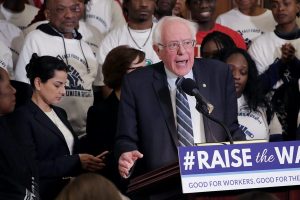CBO letter signals that Bernie Sanders' minimum wage bill may be able to pass via reconciliation

- Bernie Sanders got a CBO letter comparing the Raise the Wage Act to prior reconciliation legislation.
- Sanders wants the bill, which would raise the minimum wage to $15 by 2025, to pass via reconciliation.
- The budget scorekeeper found it would impact more budget functions, meaning reconciliation could work.
- Visit the Business section of Insider for more stories.
The Congressional Budget Office (CBO) — the government’s official budget scorekeeper — has said that the Raise the Wage Act of 2021 would have a sizeable impact on the budget. That means it may be able to clear the hurdle of the Byrd Rule and be passed through reconciliation.
The letter came in response to Sen. Bernie Sanders’ (I-Vt.) request for more information on the “breadth” of budgetary impacts from the legislation, which would raise the minimum wage to $15 by 2025, and how it stacks up to other legislation passed by reconciliation.
Sanders has made clear that reconciliation — which can pass with only Democratic votes in the Senate — is how he wants to make this a reality. “It’s gonna be in reconciliation if I have anything to say about it — it’s the only way we’re gonna get it passed,” he told Insider’s Joseph Zeballos-Roig.
The CBO compared the Raise the Wage Act to two different provisions from the Republican-authored 2017 tax act — one that allowed for oil and gas leasing in the Arctic, and another that got rid of penalties for not complying with the individual mandate — and found it impacts more budget functions than either.
That means that the minimum wage raise may not be struck down by the Byrd Rule, one of the greatest threats to it passing through reconciliation. Under the Byrd Rule, measures that are “extraneous” or “incidental” to the budget aren’t permitted in reconciliation.
Senate Minority Leader Mitch McConnell has criticized Democrats for turning toward budget reconciliation on President Biden’s $1.9 trillion stimulus relief package (as majority leader, McConnell used reconciliation to pass the 2017 tax cuts from the comparison).
The letter follows a more general report from the CBO on the Raise the Wage Act
The CBO’s general report on the legislation, published last week, found that the Raise the Wage Act of 2021 would lift 900,000 people out of poverty and increase the budget deficit by $54 billion. Another figure in the report from the nonpartisan group stuck out: the projection that, by 2025, employment would fall by 1.4 million.
Some economists took umbrage with that number, and how the CBO came to that projection.
“We believe that the CBO’s assumptions on the scale of job loss are just wrong and inappropriately inflated relative to what cutting-edge economics literature would indicate,” The Economic Policy Institute wrote in a blog post on the report. “The median employment effect of the minimum wage across studies of low-wage workers is essentially zero, according to a 2019 review of the evidence.”
Simply put, the CBO used an average estimate — looking at a wide range of studies — of what the employment loss would be, rather than a median estimate. That’s a change in methodology from CBO’s report on 2019’s Raise The Wage Act. Indeed, the report itself notes that if the CBO used the same median values from the 2019 report, it would have shown a decrease of 1.1 million, not 1.4 million.
When reached for comment, the CBO directed Insider to several sections of the report, including the explanation for means-based estimating: “This report focuses on the average (or mean) estimated change in employment because that measure captures the different effects of upward and downward variations from CBO’s baseline projections. “
Arindrajit Dube, a professor of economics at University of Massachusetts, Amherst, focused on labor economics, told Insider that he thinks the CBO’s conclusion was “somewhat pessimistic, because it both made some odd choices about how to actually take an average of those numbers, and used some decisions about what study to include or not include.”
In 2019, Dube wrote an independent review for the UK Treasury on the potential impacts of a minimum wage, and looked at data from the UK, US, and Germany. That review found that “minimum wages in a range of countries have had a negligible or zero effect on jobs, but significantly increased the earnings of the lowest paid.”
A ‘pessimistic’ view on jobs, but still some important conclusions
Regardless, the economists at EPI were heartened about the report’s projections on lifting workers out of poverty. Their previous research found that almost a third of Black workers would be impacted by an increase to the minimum wage. Currently, minimum wage workers in 15 cities are striking for a $15 minimum wage, with a focus on Black communities.
As the report from EPI says, “In the end, the CBO analysis confirms what we already knew: A higher federal minimum wage will significantly boost earnings and living standards for low-wage workers — especially those hit hardest by the COVID-19 pandemic — and it will have direct and significant fiscal effects.”
With the latest letter on the Raise the Wage Act’s potential impacts, the next step forward for raising the wage may be reconciliation.
Source: Read Full Article
